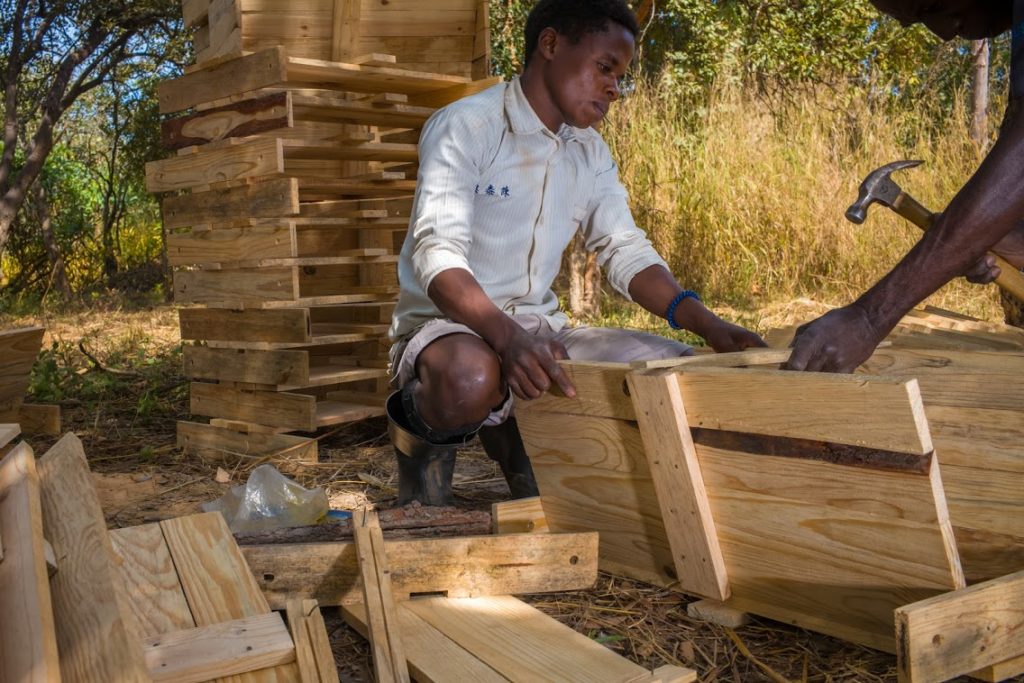Davies Ilunga is a passionate honey farmer from Northwestern Province, and the first full-time Field Supervisor at Nature’s Nectar, a sustainable honey company that was started in 2018. Mining For Zambia chatted to him about his beekeeping journey, and how he believes First Quantum Minerals’ partnership with the innovative honey start-up is benefiting the community.
You’re the first full-time Field Supervisor for Nature’s Nectar, a Northwestern Province-based sustainable honey company. How did your honey farming journey begin?
I grew up here, in Chief Ntambu’s part of Mwinilunga District, Northwestern province. This is a honey farming area, although almost nobody farms on a commercial scale. My first experience with honey farming was in 2015, when I was taken for a short training course on honey production by UNDP [the United Nations Development Programme]. I used to see how farmers with the traditional bark hives kept bees but, as I was young, I didn’t have much knowledge or experience about beekeeping.
The UNDP training got me interested, but once we had a bit of knowledge from the course, we were left without the opportunity to use what we learned practically, to gain some experience. I was eager to start beekeeping one day, but I was also thinking of sustainable ways to keep bees, because of the training I’d had. The resources were there — I could go into the forest and start barking the trees to farm honey — but now I also knew that this method would destroy the forest.
What happened next?
In 2018, I met the Nature’s Nectar team, and they seemed to have a very good plan for what was on my mind: to start beekeeping in a sustainable way that will add value to the forest. Once I had joined Nature’s Nectar, I started seeing the real benefits of honey farming because I began doing it practically.
What is sustainable honey farming? The method of sustainable honey farming being practiced by Nature’s Nectar in Northwestern Province involves replacing “bark hives” (hives made from stripped tree bark, which gradually kill the tree) with “top bar” beehives. These are locally manufactured from Copperbelt-sourced pine, and distributed by Nature’s Nectar to farmers in Northwestern Province. This beekeeping method protects the flowering trees that are essential for attracting bees, which would otherwise die from being barked. It also enables farmers to produce a higher quality honey that meets international standards for export. Nature’s Nectar is the sole buyer of all honey produced in the top bar hives that they provide to farmers. The Trident Foundation at First Quantum Minerals (FQM) provided the capital for the company’s first 7000 hives in order to facilitate the creation of a sustainable livelihood for locals.
Why do you think sustainable beekeeping and honey farming is important?
Sustainable beekeeping and honey farming is important in this part of Zambia because it’s an incentive that helps people to do sustainable forest management too. Also, it’s one of the most important sources of income in rural Zambia where employment is not high — especially in Northwestern where people need to protect their local forest.

What is the local community gaining from cooperating with Nature’s Nectar?
One thing that the community gains is sustainable bee hives at a lower cost. These hives cost a lot — over 300 kwacha each — but Nature’s Nectar is providing these hives to people at a low cost — just five kwacha. I say it’s free! Of course, the community is also gaining income that can help them pay school fees for their children. In this way, Nature’s Nectar [and its partner, FQM] are reducing poverty in the rural communities of Zambia, because not everyone has access to an income from the mines. Nature’s Nectar also makes sure they train their farmers well.
What kind of training do farmers undergo?
The most important training is for the “zone lead farmers” and their helpers. They are the general managers of the beehive, and they earn commission on the honey the farmers produce. They go through training so they can learn to make more honey, train the farmers, as well as crop the honey at the right time and leave enough honey for the bees to get into the next season. This is very important for protecting the bees’ colonies and having a sustainable practice, because the more honey we have, the more money will come into our pockets. Nature’s Nectar focuses on training — especially compared to other companies that come into the forests, give a little cash to people, and go away without training them how to do things themselves.
“The community is gaining income that can help them pay school fees for their children. In this way, Nature’s Nectar and its partner, FQM, are reducing poverty in the rural communities of Zambia, because not everyone has access to an income from the mines.”
Honey farming is one of the most important sources of income in rural areas of Zambia where employment is not high. Nature’s Nectar is making sure that they educate their farmers on forest management, and how the forest can help them if they manage it well. It’s very important because, with the other beekeeping method, every tree that is barked is killed. And those are the trees that support bees with their flowers. Nature’s Nectar is making sure that they educate people and give them information in order to do away with that.
What are the biggest changes you’ve noticed while introducing sustainable honey farming practices into communities?
In the past, in most communities people considered honey farming as a job for men, not women. Now people’s mindsets are changing. Women are also able to do honey farming because of the sustainable practices that have been introduced. People have seen the good production levels and have seen that sustainable honey farming can help them to get an income for much longer than going in the bush to look for wild honey in the trees and ant nests. Most people in the communities are showing an interest in this sustainable way of honey farming and are slowly stopping the burning and cutting of trees that leads to deforestation.
What do you like most about working with this company?
What I like most about working with Nature’s Nectar is that it’s a company that is not taking from the forest. Instead, it’s encouraging beekeepers and honey farmers to protect their local forests to help us to continually have an income. The company weighs people’s honey, and the farmers get paid immediately. They pay cash to our rural communities so that people have money to upgrade their homes with things like solar lights.
“Honey farming is one of the most important sources of income in rural areas of Zambia where employment is not high.”
This company has a big dream, a very big dream. They are increasing the income percentage for every community they work with and they are showing people how the local forest can help them — now and in future, for their children, and even their grandchildren. We will pass away, but we have to make sure we have left something for our grandchildren. If Nature’s Nectar continues with the same dream, it will help many communities in Zambia to reduce poverty and protect forests for future generations — through beekeeping.
***
Read more about FQM’s involvement in Nature’s Nectar here, and the honey company’s plans for the future — including pitching their business to 42 investors at Impact Capital Africa, in order to secure more investment.
Secondary photograph by Jasper Doest
See also: Making more than peanuts
























